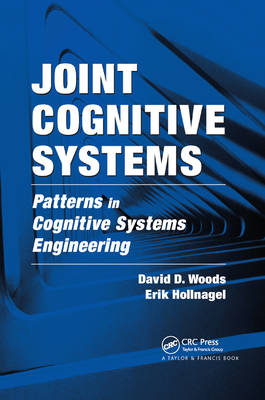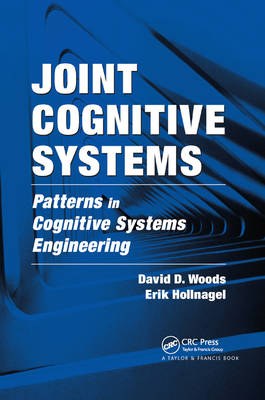
- Afhalen na 1 uur in een winkel met voorraad
- Gratis thuislevering in België vanaf € 30
- Ruim aanbod met 7 miljoen producten
- Afhalen na 1 uur in een winkel met voorraad
- Gratis thuislevering in België vanaf € 30
- Ruim aanbod met 7 miljoen producten
Zoeken
Joint Cognitive Systems
Patterns in Cognitive Systems Engineering
David D Woods, Erik Hollnagel
Paperback | Engels
€ 102,45
+ 204 punten
Omschrijving
Our fascination with new technologies is based on the assumption that more powerful automation will overcome human limitations and make our systems 'faster, better, cheaper, ' resulting in simple, easy tasks for people. But how does new technology and more powerful automation change our work? Research in Cognitive Systems Engineering (CSE) looks at the intersection of people, technology, and work. What it has found is not stories of simplification through more automation, but stories of complexity and adaptation. When work changed through new technology, practitioners had to cope with new complexities and tighter constraints. They adapted their strategies and the artifacts to work around difficulties and accomplish their goals as responsible agents. The surprise was that new powers had transformed work, creating new roles, new decisions, and new vulnerabilities. Ironically, more autonomous machines have created the requirement for more sophisticated forms of coordination across people, and across people and machines, to adapt to new demands and pressures. This book synthesizes these emergent Patterns though stories about coordination and mis-coordination, resilience and brittleness, affordance and clumsiness in a variety of settings, from a hospital intensive care unit, to a nuclear power control room, to a space shuttle control center. The stories reveal how new demands make work difficult, how people at work adapt but get trapped by complexity, and how people at a distance from work oversimplify their perceptions of the complexities, squeezing practitioners. The authors explore how CSE observes at the intersection of people, technology, and work, how CSE abstracts patterns behind the surface details and wide variations, and how CSE discovers promising new directions to help people cope with complexities. The stories of CSE show that one key to well-adapted work is the ability to be prepared to be surprised. Are you ready?
Specificaties
Betrokkenen
- Auteur(s):
- Uitgeverij:
Inhoud
- Aantal bladzijden:
- 232
- Taal:
- Engels
Eigenschappen
- Productcode (EAN):
- 9780367864156
- Verschijningsdatum:
- 10/12/2019
- Uitvoering:
- Paperback
- Formaat:
- Trade paperback (VS)
- Afmetingen:
- 155 mm x 231 mm
- Gewicht:
- 521 g

Alleen bij Standaard Boekhandel
+ 204 punten op je klantenkaart van Standaard Boekhandel
Beoordelingen
We publiceren alleen reviews die voldoen aan de voorwaarden voor reviews. Bekijk onze voorwaarden voor reviews.








